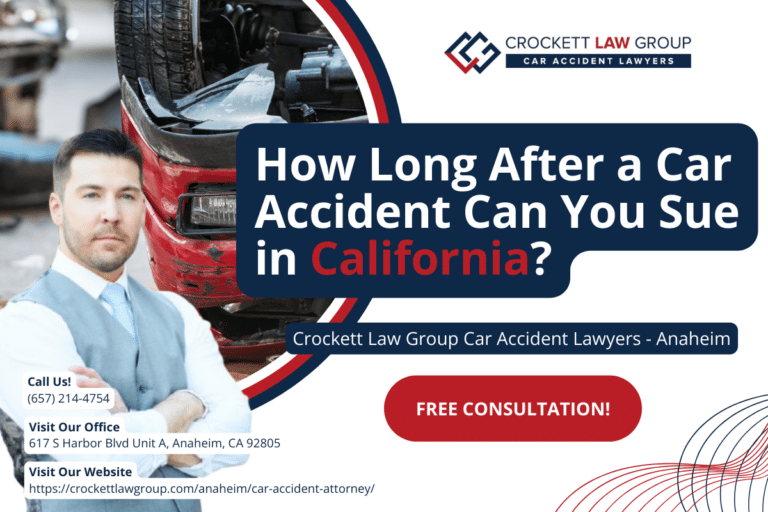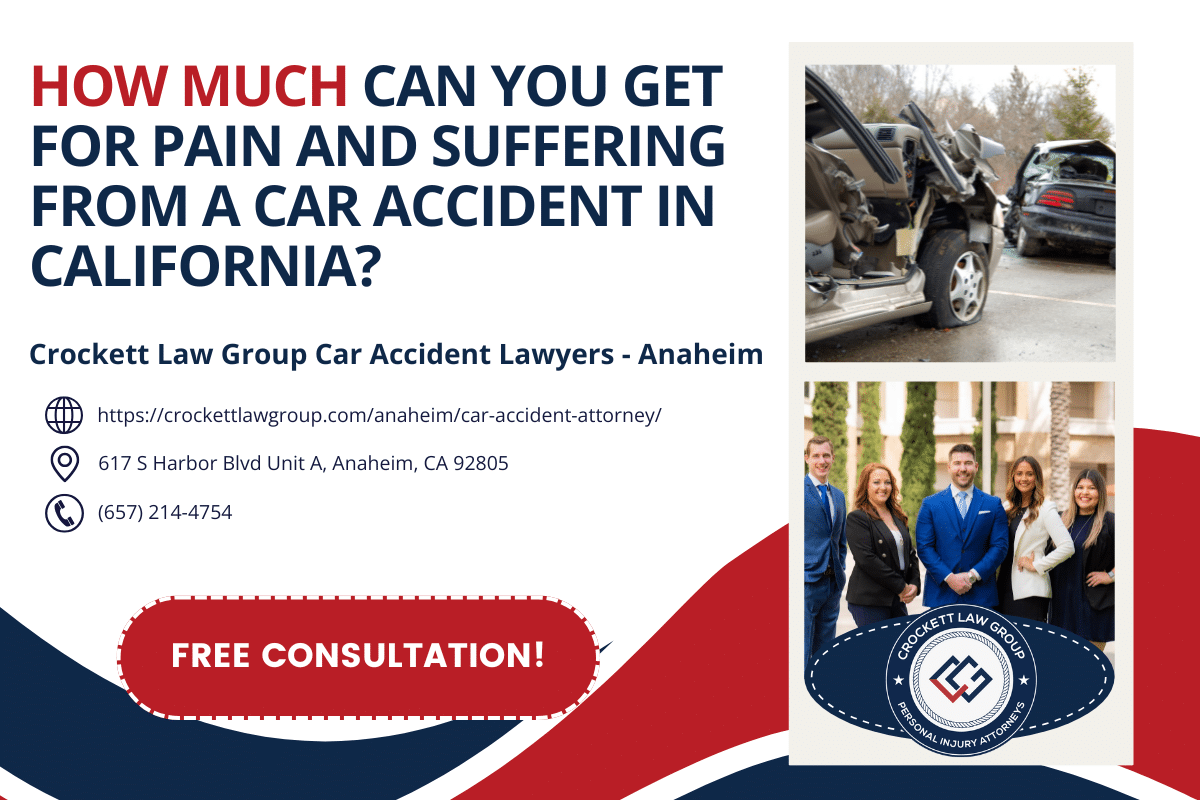You have two years from the date of a car accident to file a lawsuit in California. This deadline, called the statute of limitations, applies to most personal injury claims—although important exceptions may alter this timeline.
Below, we’ll delve into the essentials of filing a car accident claim in California. We’ll cover when the clock starts ticking, what you need to file, and how you can protect your rights. You’ll also learn how Crockett Law Group Car Accident Lawyers – Anaheim can help you navigate the process step by step.
How Long After a Car Accident Can I File a Claim in California?
In most California car accident cases, you have two years from the date of the accident to file a personal injury lawsuit (California Code of Civil Procedure § 335.1). For property damage claims, you typically have three years from the date of the incident. However, if you’re making a claim against a government entity, you must file an administrative claim within six months of the accident.
When Does the Statute of Limitations Begin for Car Accident Claims in California?
Typically, the clock starts on the date of the accident. However, if you discover injuries later—ones that couldn’t reasonably have been known right after the crash—the statute of limitations may begin on the “date of discovery” of your injury.
View this post on Instagram
A post shared by Crockett Law Group Car Accident Lawyers – Anaheim (@crockettlawgroup.anaheim)
What Is Needed to File a Car Accident Claim in California?
Before filing, gather essential documentation:
- Accident Report: Obtain the police report from the crash.
- Medical Records: Collect records of all treatments, diagnoses, and follow-up care.
- Insurance Information: Keep copies of insurance policies and communications.
- Evidence of Damages: Photos, repair estimates, and any other proof of financial losses.
- Witness Statements: Gather information from anyone who saw the accident.
Well-documented evidence helps strengthen your claim and ensures you’re accurately compensated
🚗💥 How long after a car accident can you sue in California?
You have 2 years to file, but some claims (like against govt entities) must be filed in just 6 months! ⏳ Protect your rights now!https://t.co/KSJsfBB01Ihttps://t.co/6awpVkKf8A
#CrockettLaw #AccidentLaw pic.twitter.com/ouxKevqY9u
— Crockett Law Group Car Accident Lawyers – Anaheim (@CrockettAnaheim) January 10, 2025
Essential Steps to Take Before Filing Your Car Accident Claim
- Seek Medical Attention: Even minor injuries can worsen, so get a professional evaluation.
- Notify Your Insurance: Report the accident promptly to start the claims process.
- Gather Evidence: Photographs, witness statements, and the police report are invaluable.
- Consult an Attorney (Optional but Recommended): Having legal guidance can help you avoid pitfalls.
Timing Your Car Accident Claim in California: Strategic Considerations
Filing as soon as possible is usually best. Quick action:
- Preserves fresh evidence (like eyewitness accounts).
- Helps you stay within the statutory deadline.
- Improves your negotiation position with insurers, who often reduce settlement offers if you delay.
When Should You Consider Hiring a Car Accident Lawyer?
While you can file a claim independently, a lawyer can:
- Evaluate Settlement Offers: Ensure you’re not accepting too little.
- Handle Paperwork and Deadlines: Prevent missed opportunities and errors.
- Negotiate with Insurers: Experienced attorneys know common tactics and can advocate strongly on your behalf.
- Represent You in Court: If settlement negotiations fail, litigation experience is crucial.
When Is the Right Time to File a Car Accident Claim?
Ideally, you should file your claim immediately after:
- Receiving Medical Care: Your health and well-being come first.
- Consulting a Professional: To understand your legal position and the value of your claim.
What Happens if You Miss the Deadline to File a Car Accident Claim?
If you miss the two-year deadline, your lawsuit may be dismissed. However, exceptions exist—especially if:
- You were a minor at the time of the accident.
- The injury was not discovered immediately.
- The defendant left the state for an extended period.
Always consult an attorney to see if you still have legal recourse under special circumstances.
Do I Need a Car Accident Lawyer to Help File a Claim?
You aren’t legally required to have a lawyer, but the expertise of a car accident attorney can:
- Simplify the Process: From forms to negotiations.
- Maximize Compensation: Lawyers know how to accurately assess losses.
- Provide Peace of Mind: Let a professional handle the complexities so you can focus on recovery.
How Crockett Law Group Car Accident Lawyers Help
At Crockett Law Group, we focus on delivering transparency, convenience, and high-quality legal service to those hurt in car accidents. Our team:
- Offers Clear Guidance: We break down complex legal terms and processes so you’re always in the loop.
- Handles the Heavy Lifting: From collecting evidence to negotiating with insurance companies, we manage it all on your behalf.
- Provides Personalized Strategies: Every case is unique, and we tailor our approach to fit your specific needs and goals.
With our experienced car accident attorneys at your side, you can move forward confidently—knowing you have skilled advocates fighting for your best interests.
Take the Next Step
Still have questions about filing your car accident claim in California? Reach out for a free consultation. We’ll discuss your unique situation, clarify any concerns, and help you understand your legal options.
Don’t wait—protect your right to full and fair compensation. Discover how we can help you navigate your claim with confidence.
FAQs
What is the comparative fault rule in California?
You can still recover damages in California car accidents even if you’re partially at fault, thanks to the state’s pure comparative negligence rule. In these cases, the jury assigns each party a percentage of the blame, and your compensation is reduced only by your share of the fault—meaning you can still collect a substantial portion of the award even if you bear some responsibility.
What Damages Can I Collect for a Car Accident in California?
These are the financial losses you can back up with receipts, bills, and other documentation. Examples include:
- Medical Expenses: Covers everything from hospital stays and surgeries to medications, therapy, and rehab.
- Property Damage: Pays for repairs or replacements for your car and any other valuables damaged in the crash.
- Lost Wages: Compensates you for the income you miss out on while recovering from your injuries.
What is the importance of documenting evidence?
It provides clear and reliable records of the facts, events, and damages related to your accident, making it a critical tool in your legal arsenal. Strong evidence supports your version of events, strengthens your claim, and can significantly influence the outcome of your case.










